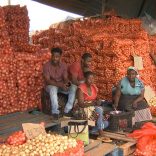Mozambique: Tuberculosis kills at least 7,000 people every year
Domestic violence at worrying levels in Mozambique

DW(File photo)
In Mozambique, six out of ten women are victims of domestic violence, NGO Fórum Mulher (Women’s Forum) says. Two daughters of former presidents, Valentina Guebuza and Josina Machel, have been victims of domestic violence.
Reports of violence are nowadays being made by women of high social class, says the organization’s director Ndzira de Deus. In the last two years, Josina Machel, the daughter of the first president of Mozambique, Samora Machel, and Valentina Guebuza, daughter of former president Armando Guebuza, were victims of violence by their partners. De Deus says politicians, who are often also aggressors, must take action.
Ndzira de Deus discussed the problem with DW Africa.
DW Africa: First of all, could you tell us about the situation regarding domestic violence in Mozambique.
Ndzira de Deus (ND): Recent studies have shown that there is an increased awareness of domestic violence among women. They are already beginning to realize that violence is an evil to be combated and have therefore broken silence and filed cases at police stations. As a result, [domestic violence] numbers have been increasing. And this year in particular, the violence has been visible in the higher social strata, not only in poorer, less economically favoured social groups.
So lately we have been hearing denunciations by upper-class women who previously would not have reported it, from shame or because it was taboo to speak of it in higher social strata, and these myths have begun falling into disrepute.

But we have always said that violence occurs in all social groups, regardless of class, race or colour, and a recent study finds that urban violence has been on the rise, especially the rape of girls and young women. And there is also a worsening in the type of violence. Aside from emotional violence, there is a physical violence so exacerbated that it often culminates in the death of the woman. Six of every ten women six are victims of domestic violence.
DW Africa: Last week the daughter of former President Armando Guebuza was shot dead, allegedly also a victim of domestic violence. But before that the daughter of former President Samora Machel was violently assaulted and lost her sight in one eye. To what extent can these cases help raise awareness of people in government and leaders in society generally?
ND: We think that breaking the silence is already a way to increase awareness of violence. We have been working on these cases for over 15 years and we have not found this kind of situation before. We knew that many [upper class women] suffered violence, but to report it publicly and say that they also suffer violence, along with the women in the market, the farmer or the vendor…
The case of Josina Machel (daughter of former president Samora Machel) shows that the administration of justice in Mozambique is fragile, because the case happened last year and a case of intimate partner violence does not take more than a month to resolve. But this case has remained unresolved for over eighteen months already. Unfortunately, we have a lot of corruption, a lot of bureaucracy, a lack of tact and sensitivity on the part of our judges and prosecutors, and so the cases end up dying.
Then comes the voice of a woman who everyone knows, who has everything she needs to live a life without violence, and she speaks out and say enough of violence and tells her own story: it awakens society to the fact that this is an evil that no one escapes and that we must fight.
DW Africa: Concerning the political class, the rulers whose homes the violence has now reached, what do you expect from now on in terms of concrete attitudes and actions?

ND: We hope that they will in fact begin to create mechanisms to respond to the issue of violence. We already have an integrated care mechanism in police stations, hospitals and refuges, but we need services to respond to the phenomenon. On the other hand, there needs to be a stronger political discourse in the sense of condemning violence and saying that we will no longer continue to tolerate it. Unfortunately this has not been much heard or particularly visible on the part of our politicians, because these are respected figures in our society. And to date they have not talked about it, even though many of them are also perpetrators of this type of violence. They are the first to sexually abuse young women, and first to beat their wives and therefore we expect a change of attitude on their part.
This issue is a national agenda priority because it ends up jeopardizing all other development efforts. I say this because the victims are under pressure, living in fear and unable to develop their potential, especially the women who have to take care of the children, the families, the orphans ….
We think it is also an opportunity for everyone to realize that our society is sick, and that we have to roll up our sleeves and take effective action. So I insist on saying that at the moment the biggest problem is the implementation of prevention mechanisms in response to what is wrong. Anyone who rapes or perpetrates violence has to go to jail, because if we continue to live in a culture of impunity, no one will believe that this is an evil that has to be addressed.
DW Africa: It is known that the government has been working to end this situation. Are joint actions between authorities and NGOs in the area frequent and fruitful?
ND: We have worked with some ministries, but unfortunately what happens is that we make proposals on how to overcome the problem, but they are not materialised. We recount what has been happening so that we can find answers, but until we get implementation, it is a great challenge. We do not see these institutions applying the recommendations that NGOs make.
We think that this is party discipline that often does not want to hurt sensitivities because there is also a certain complicity within the political parties. People who know each other do not want to challenge the systems and that’s what keeps us from solving the problem. We have to get out of this level of discussing issues at a political level and into making the decisions we should make.
We have in fact had some collaboration with institutions, even at a technical level where possible, but it is still a challenge when it comes to sharing information, because they do not disclose so we do not know where we are. We are part of the coordination group where we address all issues related to gender equality and women’s rights with the government and parliament, but we need to see more action taken.
DW Africa: The law on domestic violence was passed in 2009. What have you seen by way of implementation?
ND: It is still a taboo to discuss violence against women. We feel that there is still resistance on the part of the people who deal with cases, in the administration of justice for example, or even in the police when women go to police stations; they do not see it as a matter of law. They set the law aside and judge people by their own beliefs and experiences. So there is still work to be done to raise awareness and pressure judges and administrators to use the law as a tool to solve the cases that are presented. On the other hand, penalties are still not properly enforced, so I say that there is a void in the matter of enforcement. There is still a lot of work to be done on training and awareness.
Much of this may be due to a denial on the part of the patriarchal system itself which does not accept that women are subject to law and thinks they are objects to be used or abused and are not entitled to claim or demand anything. On the cultural side, too, there are problems, namely the great idea that a woman who makes mistakes must be educated, which means that they must be corrected, even by means of violence.
So we will continue to challenge arguments in favour of this culture for as long as needed. Until then, we will not overcome the problem. Our leaders have to shed the culture that oppresses us and violates our rights.












Leave a Reply
Be the First to Comment!
You must be logged in to post a comment.
You must be logged in to post a comment.